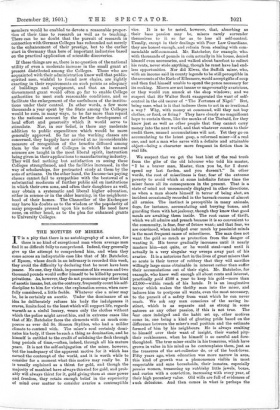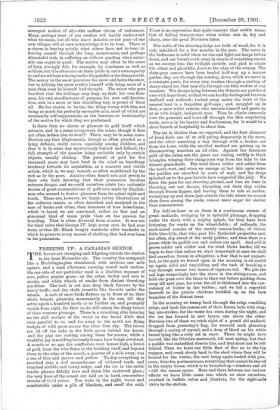THE MOTIVES OF MISERS.
IT is a pity that there is no autobiography of a miser, for there is no kind of exceptional man whom average men find it so difficult fully to comprehend. Indeed, they generally give up the attempt to comprehend him, and when they come across an indisputable case like that of Mr. Batchelor, of Epsom, whose death in an infirmary is recorded this week, they avoid the difficulty by declaring that he must have been insane. No one, they think, in possession of his reason and two thousand pounds would suffer himself to be killed by personal privations. As, however, they do not pronounce any other kind of ascetic insane, but, on the contrary, frequently count his self- discipline to him for virtue, the explanation seems, when care- fully considered, a little feeble. Whatever else a miser may be, he is certainly an ascetic. Under the dominance of an idea he deliberately refuses his body the indulgences it craves, limits food to the least which will support life, regards warmth as a sinful luxury, wears only the clothes without which the police might arrest him, and in extreme cases like that of Mr. Batchelor faces the elements with as much com- posure as ever did St. Simeon Stylites, who had a milder climate to contend with. The miser's soul certainly domi- nates his body, if there be such a thing as domination, and he himself is entitled to the credit of subduing the flesh through long periods of time,—of ten, indeed, through all his mature years. It is not the self-subjugation of the miser, however, but the inadequacy of the apparent motive for it which has earned the contempt of the world, and it is worth while to consider for a moment what this motive may really be. It is usually explained as a thirst for gold, and though the majority of mankind have always thirsted for gold, and prob- ably will always thirst for it, gold giving them at once power and freedom, they retain enough belief in the superiority of mind over matter to consider avarice a contemptible vice. It is to be noted, however, that, absorbing as their base passion may be, misers rarely surrender themselves to it so far as . to lose all self-control. Usually, except in their dealings with Poor Law Guardians, they are honest enough, and refrain from stealing with com- mendable self-command. Mr. Batchelor, for example, who, with thousands of pounds in coin actually in his house, denied himself even necessaries, and walked about barefoot to collect his rents, never stole anything, though he must have had end- less opportunities. Nor did Elwes, the Suffolk miser, who, with an income said in county legends to be still perceptible in the accounts of the Earls of Ellesmere, would accept gifts of soup and then find himself unable to spend the pence necessary for its cooking. Misers are not insane or ungovernably avaricious, or they would run amuck at the shop windows; and we suspect that Sir Walter Scott exaggerated the want of self- control in the old usurer of "The Fortunes of Nigel." But, being sane, what is it that induces them to act in so irrational a way? Why, with money at command, will they not buy clothes, or food, or firing? They have clearly no magnificent hope to sustain them, like the monks of the Thebald, for they know just as well as other people that they cannot carry money into the next world, and that whatever counts to their credit there, unused accumulations will not. Yet they go on accumulating to the latest gasp, a reformed miser—if a, real one, and not a man who saves with a definite and attainable object—being a character more frequent in fiction than in real life.
We suspect that we get the best hint of the real truth from the gibe of the old labourer who told his master, "I be a braver man, Master, than you be, for I durst spend my last farden, and you dursen't." In other words, the root of miserliness is fear, fear of the extreme poverty to avoid which at some indefinite future time the miser faces all its consequences in the present. That is a state of mind not uncommonly displayed in other directions, as when a man shoots himself in terror of being shot, an incident occasionally recorded in the barrack-rooms of almost all armies. The instinct is perceptible in many animals, dogs, for instance, accumulating and burying bones, and guarding them with hot jealousy, though they know that good meals are awaiting them inside. The root cause of thrift, which we all admire and preach because it is so convenient to the community, is fear, fear of future want; and that fear, we are convinced, when indulged over much by pessimist minds is the most frequent cause of miserliness. The man does not want the gold so much as protection from the danger of wanting iL His terror gradually increases until it nearly masters him—not quite, or he would steal—and until it actually in a very singular way sweeps away part of his avarice. It is a notorious fact in the lives of great misers that so acute is their terror of robbery that they will sacrifice willingly large sums obtainable in interest rather than suffer their accumulations out of their sight. Mr. Batchelor, for example, who knew well enough all about rents and interest, practically paid 2100 a year to keep his gold—more than 22,000—within reach of his hands. It is an imaginative terror which makes the thrifty man into the miser, and induces him to postpone all wants, even the most necessary, to the pursuit of a safety from want which he can never reach. We ask any man conscious of the saving in- stinct, which is as separate and as strong in some natures as any other passion, if this is not true. The fear once indulged and the habit set up, other motives come in, one being a kind of gloating pride based on the difference between the miser's real position and the estimate formed of him by his neighbours. He is always exulting to himself over their want of insight, their wasted pity. their recklessness, when he himself is so careful and fore- thoughted. The true miser exults in his treasures, which have grown in value in his mind as he contemplates them, just as the treasures of the art-collector do, or of the book-lover. Fifty years ago, when education was more narrow in area, this kind of growth was a phenomenon visible in most respectable and sane households, their inmates, especially passies women, treasuring up rubbishy little jewels, boxes, and curios with a conviction, increasing with every year, of their high pecuniary value. Old wills are full of evidences of such delusions. And then comes in what is perhaps the strongest motive of all,—the endless charm of endurance. Many, perhaps most, of our readers will hardly understand what we mean, but all who know Asiatics or the poor of our own villages will at once acknowledge it to be true. There is a charm in bearing quietly what others have not to bear, in forcing oneself through the long, monotonous, and perhaps distasteful task, in suffering on without quailing when natur- ally one ought to quail. The motive may often be the sense of duty, strongly felt, for example, by coachmen as well as soldiers, but it is often also an inner pride in one's own capacity to endure without wincing under the painful or the disagreeable. The sentry in the snow perceives the snow and hates the snow, but in defying the snow credits himself with being more of a man than even he himself had thought. The miser who goes barefoot that the shillings may heap up feels his own firm- ness, his own steadfastness of purpose, his own self-domina- tion, and, in a more or less chuckling way, is proud of them all. He has reason to be too, the thing wrong with him not being so much his perfectly excusable acts, most of which are necessarily self-suppressions, as the baseness or irrationality of the motive for which they are performed.
Is there then no charm or glamour in gold itself which attracts, and in a sense overpowers, the miser, though it does not often induce him to steal ? There may be in some cases. Doctors say that kleptomania, though so often pleaded as a lying defence, really exists, especially among children, and that it is in some way mysteriously limited and defined, the full strength of the passion being excitable only by certain objects, usually shining. The pursuit of gold for five thousand years may have bred in the mind an hereditaty tendency towards its acquisition, as a concrete and visible article, which is, we may remark, as often manifested by the rich as by the poor. Asiatics often hoard coin and jewels to their own hurt, knowing that their possession involves extreme danger, and we could ourselves relate two authentic stories of great accumulations of gold coin made by English- men who seemed to derive pleasure from its actual sight and touch. These are, however, we fancy, rather illustrations of the collector mania, so often described and analysed in the case of books and china, than instances of true miserliness, which is based, we are convinced, rather on fear and an abnormal kind. of mean pride than on the passion for hoarding. That is often divorced from avarice. It was not for their value that George IV. kept every coat he had ever worn, or that Mr. Blank bought wardrobe after wardrobe in which to preserve every morsel of clothing that had ever been in his possession.



































 Previous page
Previous page